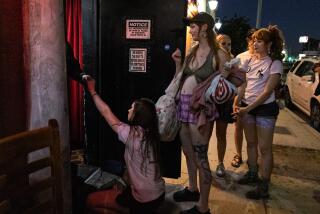Rotarians Have Reason to Stress Service Over Networking but Judge Hasn’t Bought It
- Share via
Rotarian Stefan Biermann and his wife didn’t wear pink to the Pink Panther Party the other week--a transgression normally worth a hefty “fine.”
But Kent Caldwell, who was chairing Monday’s meeting in Manhattan Beach, decided, to an accompaniment of groans, to let the party pooper off the hook and instead fined the other Rotarians $10 each “to help Stefan and Zelleka buy some pink clothes.”
Then, in an announcement, Duke Windsor--his real name is Everett but don’t call him that--asked everyone to come up with five names of potential Rotarians. And no lollygagging, please.
“We need those lists a week from today,” warned the Duke.
“Nag, nag, nag,” grumbled Dick Ackerman. “How about the FBI’s 10 Most Wanted list?”
Every week throughout the South Bay, 15 groups of men get together for the pledge of allegiance, a prayer, lunch, “fines,” announcements, a short lecture, a $10 raffle, updates on their service project and a chance to talk with each other.
The men all belong to Rotary International, an institution that since its founding in Chicago 81 years ago has become as familiar on the American scene as baseball, apple pie and popcorn at the movies. Worldwide, the organization has 900,000 members in 20,000 clubs active in 54 countries. In District 528, which takes in the western part of the Los Angeles basin, there are 45 clubs with 3,000 members.
Despite its noncontroversial nature as a service organization, its status as a male-only club has been under attack for almost a decade and this week a U. S. Supreme Court justice denied a request to let the club remain all-male.
In Manhattan Beach, women would find not the Norman Rockwell images of the haberdasher meeting with the grocer, but more of the high-tech, upscale social scene of this town, where the median household income in 1985 was $38,945 and many work in or around the aerospace industry.
Ackerman, a Ph.D., is the assistant program manager of a classified project in TRW’s space and technology group. Biermann works for a computer company. The group Monday included Scotty Dannison, an international marketing director at Xerox, and a certified public accountant, John Rhind.
Among the old-timers was Earl Brown, 82, superintendent of the South Bay Union High School District for 18 years, active despite the lingering effects of a stroke, and Harry Keller, an Alhambra car dealer who helped found the Manhattan Beach chapter and remains a passionate Rotarian after 48 years in the organization.
“I come down here every Monday because I love it,” he said.
Lunch was white wine and chicken Parmesan in the back room at O’Neill’s Continental Grill. On the wall were banks of Rotary Club banners from all over the world--Japan, Tahiti, Paris, Montreal, to name a few.
At one table, the group was less interested in sports or other staples of male conversation than swapping stories about flying around the world on business trips while avoiding Athens, Rome and Cairo--airports with a high profile in the world of Middle East terrorism.
“It is hard to get to Europe from Bangkok without going through Athens, Rome or Cairo,” said Ackerman, “but you can do it.”
Biermann reflected on national differences in the Rotary movement.
In Germany, where he was born, “it is very strict, very formal,” he said. Few under 40 are admitted and most German Rotarians are ranking executives, he said. Biermann said this reflects a more stratified European culture where promotions in business come more slowly than in the United States.
Even so, he asserted, the intensity of the German Rotarians pales when compared with the Japanese: “The Japanese almost make a cult out of it.”
Biermann, who is in his 30s, said he joined because he gets to meet different sorts of people. He is excited about the prospects of the next international convention in Munich.
“There are some bigwig politicians. It is nice because you wouldn’t get to meet them otherwise. They talk to you like they are old friends,” he said.
Rotarians, who were networking before the word existed, now minimize this aspect of the organization, stressing instead its service component.
Said Caldwell, “They really don’t push the networking. . . . In the Rotary, it really is the service. There is some (networking), but it is downplayed.”
One of the main service projects of the Manhattan Beach Rotary Club is taking hot meals, prepared by the Salvation Army, to 15 homebound people every Wednesday. Members, in rotation, sign up for four visits a year.
The clubs have legal reasons to talk up the service aspect.
This week, Supreme Court Justice William Rehnquist prevented Rotary International from ousting the Duarte chapter because it admitted women.
The justice let stand a California appellate ruling that Rotary Clubs are business establishments barred by the state Unruh Act from engaging in discrimination based on race, sex, religion or ethnic origin. The appellate overturned a lower court ruling that stated that a Rotary Club was a service organization not covered by the Unruh Act. The appellate court ordered Rotary International, which has until Sept. 15 to appeal, to reinstate the Duarte club, which had been ousted in 1978.
Legal arguments brought against the organization maintained that its members establish business and professional relationships through the clubs that women are frozen out of because they cannot join.
In the Manhattan Beach club, the two old-timers disagreed about whether the clubs should admit women.
“I love women,” said Keller, “but Rotary has been 80 years without them.” Said Brown: “I personally would like to have them but I think I am in the minority.”
More to Read
Sign up for Essential California
The most important California stories and recommendations in your inbox every morning.
You may occasionally receive promotional content from the Los Angeles Times.










